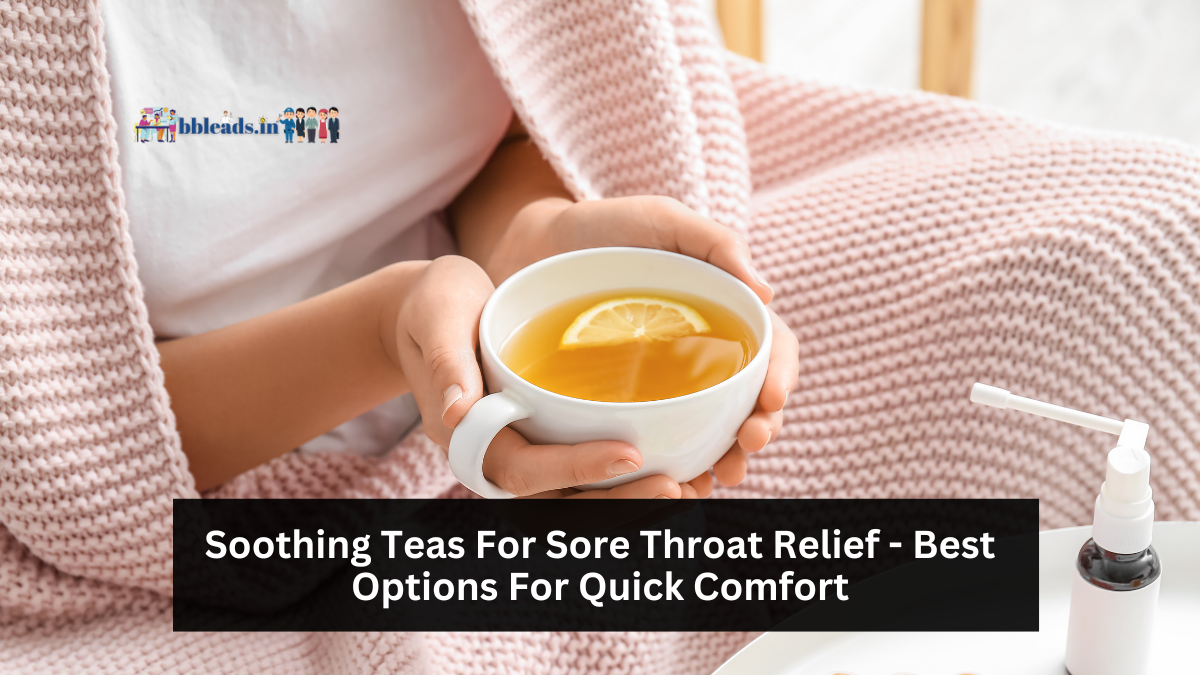A warm cup of tea can help with a sore throat by itself. Many kinds of tea not only help with discomfort but also lower inflammation and enhance general throat health. This page investigates the best teas for sore throat alleviation, their advantages, and how they help to reduce pain.
Why Does Tea Help A Sore Throat?
Antioxidants, anti-inflammatory agents, and warmth found in tea help a sore throat right away. While some components, particularly teas, target germs, viruses, and inflammation, hot tea naturally reduces throat pain by moisturizing and lowering irritation. Often caused by infections, allergies, or dryness, a sore throat can be significantly relieved with teas with medicinal qualities.
1. Chamomile Tea
Chamomile tea is well-known for its relaxing benefits. It is particularly beneficial for a sore throat because of its anti-inflammatory and antibacterial qualities. The flavonoids in chamomile help fight inflammation and might lower throat area swelling.
Chamomile eases throat irritations and facilitates swallowing by calming affected tissues.
For the greatest effect, steep chamomile tea for five to ten minutes. Adding honey might improve its relaxing properties.
2. Peppermint Tea
Because of its menthol concentration, peppermint tea offers a cooling sensation that can benefit sore throats. Acting as a natural decongestant, peppermint menthol helps clear sinuses and ease throat inflammation.
Peppermint tea’s antiviral and anti-inflammatory qualities might help with sore throat-causing illnesses and pain management.
Brew peppermint tea for five to seven minutes. Both drinking it warm and letting it cool slightly provide good relief.
3. Ginger Tea
Ginger tea is a strong anti-inflammatory beverage that helps with throat irritation and inflammation. The main ingredient in ginger, gingerol, targets throat infections directly with antibacterial action.
While attacking bacterial or viral causes, ginger tea lowers inflammation and eases discomfort.
One preparation tip is steeping fresh ginger slices in hot water for ten to fifteen minutes. Adding lemon and honey enhances its advantages and gives extra throat relief.
4. Licorice Root Tea
One famous herbal cure for coughs and sore throats is licorice root tea. Its naturally sweet taste helps calm inflammation and coats the throat. Glycyrrhizin found in licorice has strong antiviral and anti-inflammatory effects.
This tea lessens throat pain, inflammation, and swelling. Studies reveal that licorice root is very helpful in lowering symptoms of sore throat following operations or infections.
Prepare licorice root tea by steeping it for five to seven minutes. Large amounts of licorice tea should be avoided since glycyrrhizin can induce high blood pressure if overindulged.
5. Marshmallow Root Tea
Mucilage—a thick material that coats the throat—found in marshmallow root tea helps to ease discomfort and inflammation. It also acts as a barrier against further throat discomfort, providing protection.
The demulcent qualities of marshmallow root tea help to coat the throat, shielding it from irritants and lowering inflammation.
Steep marshmallow root in hot water for ten to fifteen minutes. For more sweet relief, combine it with honey.
6. Green Tea
Green tea is a well-rounded tea selection. It is rich in antioxidants and has anti-inflammatory properties. Its vital molecules and catechins assist the immune system in battling infections and calming throat inflammation.
Green tea lessens throat irritation and guards against viruses and bacteria. Its antioxidants aid in hastening healing.
To avoid bitterness, brew green tea for three to five minutes. Honey addition enhances taste and is suitable for you.
7. Slippery Elm Tea
For millennia, slippery elm tea has been sought after for its ability to cover and calm the throat. Slippery elm shares mucilage with marshmallow root, which creates a protective covering.
This tea offers a barrier to prevent further irritation and helps sore throats. Slippery elm lowers inflammation, improving general throat condition.
Steep, slippery elm powder in boiling water for about five minutes. Honey or lemon would help to accentuate its moderate taste.
8. Honey And Lemon Tea
Adding honey and lemon will enhance any tea’s relaxing qualities. Honey naturally suppresses coughing and offers a throat covering that guards against damage. Packed with vitamin C, lemon strengthens immunity and aids in illness prevention.
Honey helps by coating the throat, lessening inflammation, and antibacterial properties.
Lemon helps break down mucus, facilitating breathing and easing congestion related to sore throats.
Best Strategies For Using Tea As A Sore Throat Fix
- Drink tea steadily and gently during the day for optimal effects. Try warm, not boiling tea; too much heat can aggravate the throat more. Decaffeinated teas also help a sore throat since caffeine can cause dehydration and aggravation of throat inflammation.
- Teas help the body to heal as they hydrate it.
Warm teas calm without aggravating, thus they are most beneficial.
Two tea drinkings three times a day helps heal and moisten the throat.
FAQs
Q1. Which Tea Is The Best For Immediate Sore Throat Relief?
Chamomile tea is an excellent option for immediate relief due to its anti-inflammatory and calming properties.
Q2. Can Drinking Tea Cure A Sore Throat Completely?
While tea relieves symptoms, it may not cure a sore throat if the underlying cause is an infection. Medical consultation is advised for persistent soreness.
Q3. How Much Tea Should Be Consumed Daily For Sore Throat Relief?
Drinking two to three cups of tea daily is generally recommended for effective sore throat relief and hydration.
Q4. Is It Safe To Add Honey To Tea For A Sore Throat?
Yes, honey is safe and beneficial for sore throat relief. However, children under one year should avoid it due to the risk of botulism.
Q5. Can Cold Tea Be Effective For A Sore Throat?
Cold tea can relieve certain sore throat conditions, but warm tea is typically more effective in soothing and reducing throat irritation.
